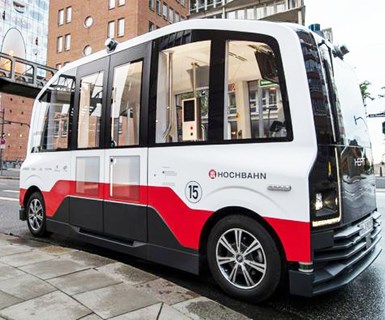Hamburg to Test Autonomous Shuttle Bus
The Hamburg Electric Autonomous Transportation (HEAT) coalition plans to begin testing a self-driving shuttle bus on public streets in August.
The Hamburg Electric Autonomous Transportation (HEAT) coalition plans to begin testing a self-driving shuttle bus on public streets in the city next month.

The 10-seat electric vehicle was developed by German engineering specialist IAV Group. The shuttle, which can travel at a speed as great as 50 km/hr (31 mph), will make five stops along a 1.2-mile route.
In addition to lidar, radar and cameras, the minibus will communicate with roadside sensors and a central control center. Operators at the center will continuously monitor the vehicle and can remotely control it if necessary.
During initial tests, the vehicle will run without passengers and have a backup driver onboard. Passenger service with a safety driver is due to begin in mid-2020.
HEAT aims to have the vehicle operate autonomously (SAE Level 4) without an attendant by October 2021 in conjunction with the World Congress for Intelligent Transport Systems conference. As part of the run-up to the event, Hamburg is upgrading traffic lights to enable vehicle-to-infrastructure communication.
Other partners in the consortium include Siemens (V2I communications), Vattenfall (battery recharging stations), DLR (data analytics and consumer research) and the Institute for Climate Protection, Energy and Mobility (legal services). Hochbahn will be responsible for project management, implementation and operating the control center.
RELATED CONTENT
-
Cobots: 14 Things You Need to Know
What jobs do cobots do well? How is a cobot programmed? What’s the ROI? We asked these questions and more to four of the leading suppliers of cobots.
-
Engineering the 2019 Jeep Cherokee
The Jeep Cherokee, which was launched in its current manifestation as a model year 2014 vehicle, and which has just undergone a major refresh for MY 2019, is nothing if not a solid success.
-
On Electric Pickups, Flying Taxis, and Auto Industry Transformation
Ford goes for vertical integration, DENSO and Honeywell take to the skies, how suppliers feel about their customers, how vehicle customers feel about shopping, and insights from a software exec








